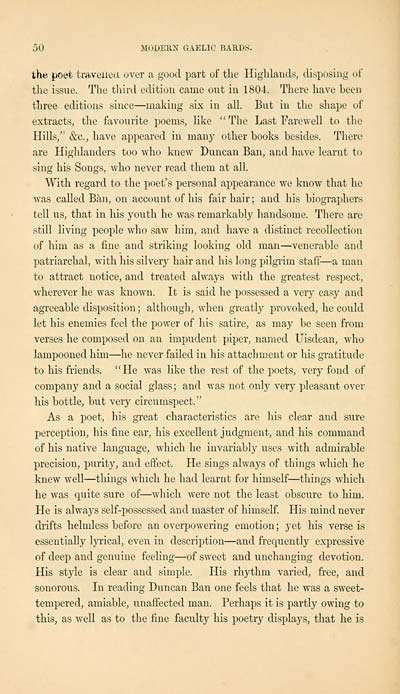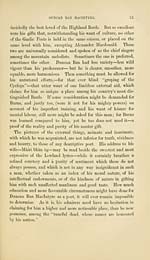Download files
Complete book:
Individual page:
Thumbnail gallery: Grid view | List view

50 MODERN GAELIC BARDS.
the poet travelled over a good part of the Highlands, disposing of
the issue. The third edition came out in 1804. There have been
three editions since — making six in all. But in the shape of
extracts, the favourite poems, like " The Last Farewell to the
Hills," &c., have appeared in many other books besides. There
are Highlanders too who knew Duncan Ban, and have learnt to
sing his Songs, who never read them at all.
With regard to the poet's personal appearance we know that he
was called Ban, on account of his fair hair; and his biographers
tell us, that in his youth he was remarkably handsome. There are
still living people who saw him, and have a distinct recollection
of him as a fine and striking looking old man — venerable and
patriarchal, with his silvery hair and his long pilgrim staff — a man
to attract notice, and treated always with the greatest respect,
wherever he was known. It is said he possessed a very easy and
agreeable disposition ; although, when gi'eatly provoked, he could
let his enemies feel the power of his satire, as may be seen from
verses he composed on an impudent piper, named Uisdean, who
lampooned him — he never failed in his attachment or his gratitude
to his friends. "He was like the rest of the poets, very fond of
company and a social glass ; and was not only very pleasant over
his bottle, but very circumspect."
As a poet, his great characteristics are his clear and sure
perception, his fine ear, his excellent judgment, and his command
of his native language, which he invariably uses with admirable
precision, purity, and effect. He sings always of things whicli he
knew well — things which he had learnt for himself — things which
he was quite sure of — which were not the least obscure to him.
He is always self-possessed and master of himself. His mind never
drifts helmless before an overpowering emotion ; yet his verse is
essentially lyrical, even in descrij)tion — and frequently expressive
of deep and genuine feeling — of sweet and unchanging devotion.
His style is clear and simple. His rhythm varied, free, and
sonorous. In reading Duncan Ban one feels that he was a sweet-
tempered, amiable, unaffected man. Perhaps it is partly owing to
this, as well as to the fine faculty his poetry displays, that he is
the poet travelled over a good part of the Highlands, disposing of
the issue. The third edition came out in 1804. There have been
three editions since — making six in all. But in the shape of
extracts, the favourite poems, like " The Last Farewell to the
Hills," &c., have appeared in many other books besides. There
are Highlanders too who knew Duncan Ban, and have learnt to
sing his Songs, who never read them at all.
With regard to the poet's personal appearance we know that he
was called Ban, on account of his fair hair; and his biographers
tell us, that in his youth he was remarkably handsome. There are
still living people who saw him, and have a distinct recollection
of him as a fine and striking looking old man — venerable and
patriarchal, with his silvery hair and his long pilgrim staff — a man
to attract notice, and treated always with the greatest respect,
wherever he was known. It is said he possessed a very easy and
agreeable disposition ; although, when gi'eatly provoked, he could
let his enemies feel the power of his satire, as may be seen from
verses he composed on an impudent piper, named Uisdean, who
lampooned him — he never failed in his attachment or his gratitude
to his friends. "He was like the rest of the poets, very fond of
company and a social glass ; and was not only very pleasant over
his bottle, but very circumspect."
As a poet, his great characteristics are his clear and sure
perception, his fine ear, his excellent judgment, and his command
of his native language, which he invariably uses with admirable
precision, purity, and effect. He sings always of things whicli he
knew well — things which he had learnt for himself — things which
he was quite sure of — which were not the least obscure to him.
He is always self-possessed and master of himself. His mind never
drifts helmless before an overpowering emotion ; yet his verse is
essentially lyrical, even in descrij)tion — and frequently expressive
of deep and genuine feeling — of sweet and unchanging devotion.
His style is clear and simple. His rhythm varied, free, and
sonorous. In reading Duncan Ban one feels that he was a sweet-
tempered, amiable, unaffected man. Perhaps it is partly owing to
this, as well as to the fine faculty his poetry displays, that he is
Set display mode to: Large image | Transcription
Images and transcriptions on this page, including medium image downloads, may be used under the Creative Commons Attribution 4.0 International Licence unless otherwise stated. ![]()
| Early Gaelic Book Collections > Ossian Collection > Selections from the Gaelic bards > (74) |
|---|
| Permanent URL | https://digital.nls.uk/78070436 |
|---|
| Description | Selected books from the Ossian Collection of 327 volumes, originally assembled by J. Norman Methven of Perth. Different editions and translations of James MacPherson's epic poem 'Ossian', some with a map of the 'Kingdom of Connor'. Also secondary material relating to Ossianic poetry and the Ossian controversy. |
|---|
| Description | Selected items from five 'Special and Named Printed Collections'. Includes books in Gaelic and other Celtic languages, works about the Gaels, their languages, literature, culture and history. |
|---|

